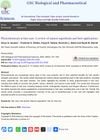January 2025 in “Pharmaceuticals” Nanocarriers can improve antioxidant delivery to the skin but face safety and production challenges.
[object Object]  December 2024 in “Animals”
December 2024 in “Animals” Tithonia diversifolia extract improved digestion but didn't enhance lamb growth.
 December 2024 in “Frontiers in Pharmacology”
December 2024 in “Frontiers in Pharmacology” Araliadiol may promote hair growth like minoxidil without being toxic.
 November 2024 in “Applied Sciences”
November 2024 in “Applied Sciences” Wild strawberry waste extract can be a sustainable cosmetic ingredient for treating acne and hair loss.
 October 2024 in “International Journal of Molecular Sciences”
October 2024 in “International Journal of Molecular Sciences” Rosa rugosa extract promotes hair growth and could be a natural treatment for hair loss.
 October 2024 in “International Journal of Ayurveda Research”
October 2024 in “International Journal of Ayurveda Research” Emblica officinalis and Eclipta alba may help treat hair loss naturally.
 August 2024 in “Applied Sciences”
August 2024 in “Applied Sciences” Plant extracts may help prevent or reverse hair graying.
May 2024 in “Frontiers in Nutrition” Turning food waste into useful products is key for a sustainable economy.
 April 2024 in “Chemical engineering journal”
April 2024 in “Chemical engineering journal” The new hydrogel made from thymol and glycyrrhizin helps heal MRSA-infected wounds in rats effectively.
 April 2024 in “Scientific reports (Nature Publishing Group)”
April 2024 in “Scientific reports (Nature Publishing Group)” Rosemary and neem extract may be an effective natural treatment for dandruff and hair loss.
 March 2024 in “Nutrients”
March 2024 in “Nutrients” Gynostemma pentaphyllum and its component damulin B could help hair grow by activating certain cell pathways.
February 2024 in “Cosmetics” The conclusion is that new plant-based treatments for hair loss may work by targeting certain enzymes.

Solanum nigrum may help treat hair loss.
 January 2024 in “Biochemistry Research International”
January 2024 in “Biochemistry Research International” Compounds from Ziziphus spina-christi roots show strong antibacterial and antioxidant potential.
November 2023 in “Plants” Compounds from Jatropha cordata bark have significant anti-inflammatory effects and could help with hair loss.
October 2023 in “Applied sciences” Iris germanica rhizome-derived exosomes help protect skin cells from oxidative stress and aging.

Certain natural products may help stimulate hair growth by affecting stem cell activity in the scalp.

New treatments for hair loss should target eight main causes and use specific plant compounds and peptides for better results.
 July 2023 in “Pharmacognosy Magazine”
July 2023 in “Pharmacognosy Magazine” Cerasus serrulata flower extracts have strong antibacterial and antioxidant effects and may help prevent hair loss.
 June 2023 in “Journal of Education, Health and Sport”
June 2023 in “Journal of Education, Health and Sport” CBD is effective for certain epilepsy conditions, shows promise for other health issues, but needs more research for safety and effectiveness.
 October 2022 in “Legume Research”
October 2022 in “Legume Research” The research found a way to grow plant tissue and analyze compounds in Bituminaria bituminosa, which is promising for hair restoration treatments.
 January 2018 in “Journal of translational science”
January 2018 in “Journal of translational science” Eating alfalfa sprouts every day can raise testosterone levels in middle-aged men, but broccoli sprouts don't have this effect.
September 2024 in “Journal of Ethnopharmacology” Terminalia bellirica extracts effectively promote hair regrowth and treat androgenetic alopecia.
[object Object]  July 2024 in “Journal of Education For Sustainable Innovation”
July 2024 in “Journal of Education For Sustainable Innovation” Visualizing data helps guide future androgenetic alopecia research and policies.
 July 2023 in “Research journal of pharmacy and technology”
July 2023 in “Research journal of pharmacy and technology” The hair tonic with Capsicum frutescens extract helps hair grow in male rabbits.
January 2023 in “Pharmaceutics” AA–TF#15 significantly promotes hair regrowth and could be an effective treatment for androgenic alopecia.
Sansevieria trifasciata Prain shows promise for treating hair loss by inhibiting androgen receptors.
 January 2025 in “Nutrients”
January 2025 in “Nutrients” Genetic factors and diet significantly increase the risk of male pattern baldness.
 November 2024 in “GSC Biological and Pharmaceutical Sciences”
November 2024 in “GSC Biological and Pharmaceutical Sciences” Phytochemicals from plants can improve hair growth, strength, and scalp health.
 12 citations,
November 2017 in “Archives of Dermatological Research”
12 citations,
November 2017 in “Archives of Dermatological Research” Mediterranean diet with fresh herbs and vegetables lowers male hair loss risk.





















